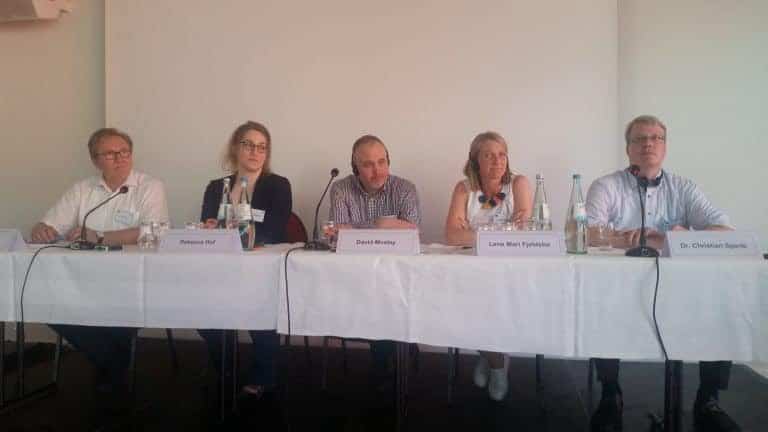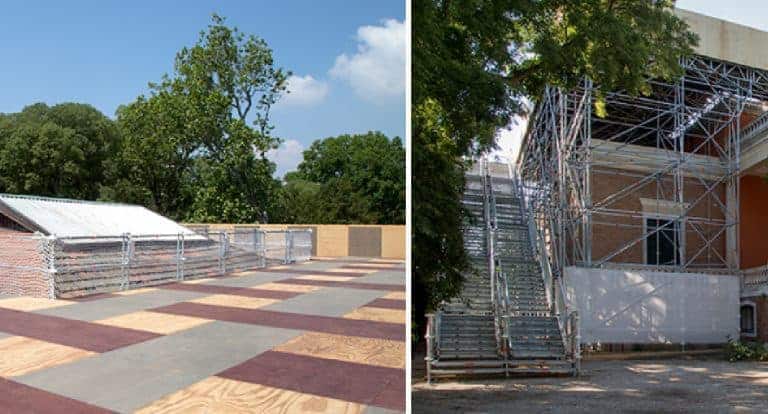Bricklayers Find Clever and Funny Way Round ‘No Shorts’ Ruling
The weather has been pretty hot up and down the country in the UK in recent months it’s fair to say. In actual fact, pretty hot is putting it lightly to say the very least. Anyone that works outside would probably appreciate how some brickies felt when their boss told them not to wear shorts at work, even though it was a whopping 26 degrees Celsius. What would you do if you were told the same? In a hilarious twist, perhaps you should take a leaf out of those brickies books..
The brickies were told they were not permitted to wear shorts, even in weather so hot that it was uncomfortable for them to work in jeans and other work trousers. The brickies, who were based at a construction site in the town of Chertsey in Surrey, almost contemplated looking for other work until they found a way around the ruling with a truly ingenious, and let’s face it, funny move.
Brickies Find An Ingenious Loophole to the Ruling
Proving that there is more to brickies than meets the eye, they discovered a way round, what they saw as unfair rules, by using the gender equality regulations to their benefit. How did they do it?
The clever chaps turned up to work wearing a stunning array of women’s summer frocks and dresses. As well as using the gender equality regulations, they also took inspiration from stories involving schoolboys who have done similar at their school, where similar rules have been upheld about wearing shorts.
The fellas, who were working at Bellway Homes construction site, turned up wearing an assortment of dresses and skirts. Simon Miles wore a denim skirt belonging to his wife, stating that he was going to find another job and that many of his colleagues were really finding it uncomfortable and difficult to work in jeans. That was until he and the rest of his workmates realised that as there were female employees that worked in the office on site who obviously wore skirts and dresses, that they couldn’t possibly do anything if the brickies did the same.
Bricklayers Loved Their Skirts and Dresses
Adam Houdoire, one of Miles’ colleagues opted for a budget option of a supermarket £10 dress. Houdoire curiously said something we never thought a bricklayer would say about woman’s clothing – that he loved it and felt that it gave him a lot more freedom to work more comfortably than he would have been able to in jeans or other forms of trousers.
In a strange reversal of roles, Miles also noted that he had been wolf-whistled by a man, suggesting that he had never experienced that before. Joking aside, we feel that this funny little tale gives insight to a more serious issue. If bricklayers and other construction site employees have to work in hot climates and we want them to do the best work they can, does it not make sense to allow some leeway with regards to the health and safety regulations.
UK Represented at European Scaffolding Summit By NASC
Earlier this month NASC attended a European scaffolding summit that took place in Germany, representing the British scaffolding industry.
The UEG with the SBS organised a special panel-based discussion meeting and invited NASC to send representatives to Cologne, who flew out to take part. NASC is one of the founding members of the UEG, which is a trade body that oversees national scaffolding organisations throughout Europe. While the SBS was founded as a support for the EU to give SMEs based and operating in the EU representation when it comes to the process of meeting standards in the European and international markets. The summit was divided into two different panel discussions. While the first dealt with the review of CEN TC 53 standards, the second focused on utilising the Erasmus Plus programme to exchange trainees in the scaffolding industry. There was also working group meeting help by the UEG to push ahead with the establishment of a standard in common risk assessment. The piece of documentation, which will be a supplement to the practical guideline for supply/provision and the operation of protective and working scaffolds (UEG 2016) and will be published by the organisation in the very near future. According to the managing director of NASC, Robin James, the discussion summit highlighted even more so why the UEG is important as a forum for discussing matters relating to the European scaffolding industry. The event and past events like it, which was attended by European delegates from all over the continent, is supported financially by SBS. James noted “A number of national scaffolding organisations across Europe are looking to join UEG. Associate membership is also strong, with supplier organisations from all over Europe looking to be part of a body which represents the European scaffolding industry.” Introductory comments were made by Dagmara Chodzicka-Merken (EU Legal & Policy Officer), Christel Davidson (SBS Director), Martine Angele (UEG President) and was introduced by the UEG and SBS expert, Christoph-Ludwig Bugler. National organisations in countries such as Sweden, France, Norway and Germany all had representatives in attendance at this panel and there was a strong encouragement for those representatives to continue the discussions within their own national committees, as the CEN meetings and decisions they make are relevant and affect anyone working within the European scaffolding sector. From this discussion panel, it was clearer than ever that the UEG has a very crucial role in the facilitation of discussion and debate relating to CEN TC 53 standards. During the second panel there were examples given of the opportunities scaffolding trainees had to participate in training exchanges in different countries throughout Europe. It highlighted the success of the informal agreements of trainee exchanges happening at the moment between Germany and Switzerland and Germany and Norway, in the hope that as this initiative benefits those trainees in the industry, that it would continue to expand. It was clear from the discussion that the UK is a location that is in high demand for this kind of exchange arrangement. The introduction for the discussion was made by the ZDH representative Dr Christian Sperle of ZDH (Zentralverband des Deutschen Handwerks) who spoke of his disappointment and the negative aspects of Brexit. In attendance for this panel was British, Norwegian and German representatives, alongside the NASC Director of Training & CISRS Manager, David Mosley, who spoke positively and passionately about the training that takes place in the British scaffolding industry. He was assisted, of course, by a translator. Birgid Becker (Deutschlandfunk) did a fine job of chairing the panel, with ease and respect. After the conclusion of the event, all delegates in attendance from a variety of different European organisations enjoyed some local food and hospitality and participated in some fine networking.Generation UK Provide Altrad Futuro System Scaffold For The 16th International Architecture Exhibition 2018 In Venice
Rilmac Scaffolding Bags Major University Of Warwick Project
The redevelopment of Cryfields Student Village at the University of Warwick will see 828 new bedrooms provided across 12 buildings including townhouses and cluster blocks.
The £57m Student Village development also includes a ‘village hall’ which will contain meeting areas, offices, a laundrette and post room. Rilmac Scaffolding will be on site for up to two years, providing continual access scaffolding for Kier who are the developers of this key project. Having worked closely with Kier for many years Rilmac say they are ideally suited to ensure the required high standards and professional delivery are met. This prestigious new contract increases Rilmac’s involvement in higher education development projects to more than half a dozen currently working on-site or recently completed. With the marketplace for student accommodation growing 17% annually, Rilmac expect that there are more opportunities on the horizon as well. “We are experienced in long-running projects on large construction sites like Cryfields Village,” said Sam McSpadden Director at Rilmac Scaffolding “We are looking forward to progressing at the University of Warwick. Kier’s confidence in us to deliver on site underlines the hard work everyone at Rilmac has put in over the past few years to develop our capabilities in this area.” “This is another major development we have become involved in across the country,” added Rilmac Scaffolding Managing Director Des Booth, “Congratulations to everyone in the team who made this possible.” Since Rilmac Scaffolding launched back in 1990 the firm has grown from a six-man operation to a nationwide business, employing over 150 people, and working on many key construction projects nationwide.Bamboo Scaffolding to be ‘Upcycled’ In China
Hong Kong is backing the innovative upcycling of bamboo previously used as scaffolding on construction sites in the region.
As a forward-thinking initiative, the practice is set to both revolutionise how this natural material is facilitated in future, and avoid unnecessary landfill. Extremely strong and resilient, bamboo scaffolding is a familiar sight in this part of the world. It’s also ideal for creating temporary structures, being incredibly versatile and cost effective. This year alone 49 tonnes of bamboo was used to set up stalls at 15 Lunar New Year fairs. And it was all collected as part of the Reuse & Upcycling Programme. The scheme was set up by the Environmental Protection Department and the Environmental Campaign Committee, together with non-profit organisations Green Come True and JupYeah. Green Come True Co-founder Hill told Scaffmag bamboo can be made into a wide variety of objects including tables and swings. But there’s so much more to the story as the organisation has discovered at their workshops, with individuals producing a wide variety of things including wind chimes, pen holders and even rain sticks resembling the noise of rainfall. The possibilities are endless. Co-founder Ren Wan said: “If we want to solve our environmental problems we need creativity to explore more possibilities.” Participant Ho Siu-yu firmly believes upcycling the bamboo helps lessen the burden on Hong Kong’s landfills. She said: “Our landfills are nearly at capacity, so I believe it will be good for Hong Kong if we recycle or upcycle more materials. Looking after the environment is really important for us all.” It’s a feeling shared by all of those involved. The aim now is to get the message out to as many people as possible. “The Reuse & Upcycling Programme for Bamboo shows upcycling can be a fun process”, added Environmental Protection Department senior administrative officer James Chan. “We would like to use the programme as a means to tell the public that if we unleash our creativity, we can really show our care to the environment and have fun along the way.” The department plans to continue collecting used bamboo from Lunar New Year fairs, and to invite more organisations to participate in the programme. In essence, scaffolding in China can now serve a huge range of purposes. It’s also positive proof, some construction materials can be successfully upcycled, with the people of Hong Kong leading the way.Equality and Diversity at the TRAD Group
 The TRAD Group are keenly aware of how important their people are to the success of the business. They believe in teamwork, mutual support and encouraging all their staff to continually develop their skills and extend their careers, and become the best they can be.
The TRAD Group is also well-known for its stance on encouraging women to pursue careers in the construction sector. With more than 50% of their office staff women, many in Senior positions it’s a principle close to their hearts. To highlight the commitment TRAD are founding sponsors of the ‘Inspire Me’ campaign hosted by Construction news.
Women are under-represented across construction generally, and in scaffolding in particular. While the nature of the work may be largely to blame, there are many positions at TRAD where women have made major contributions to their success, for example in areas such as surveying and estimating.
The TRAD Group are keen to build on this success and encourage more women to purse professional and managerial careers, with the chance to move into senior leadership positions.
UK legislation, of course, sets minimum standards for companies to support workplace diversity and equality. At TRAD, they want to go beyond these minimum standards and set the bar much higher. The aim is to establish a fully inclusive environment that contributes to their employees’ well-being and success.
One of TRAD’s key objectives is to create mentoring and training schemes to give women the chance to become operational heads within supervision and contracts management, with the chance to eventually become board directors.
The TRAD Group are keenly aware of how important their people are to the success of the business. They believe in teamwork, mutual support and encouraging all their staff to continually develop their skills and extend their careers, and become the best they can be.
The TRAD Group is also well-known for its stance on encouraging women to pursue careers in the construction sector. With more than 50% of their office staff women, many in Senior positions it’s a principle close to their hearts. To highlight the commitment TRAD are founding sponsors of the ‘Inspire Me’ campaign hosted by Construction news.
Women are under-represented across construction generally, and in scaffolding in particular. While the nature of the work may be largely to blame, there are many positions at TRAD where women have made major contributions to their success, for example in areas such as surveying and estimating.
The TRAD Group are keen to build on this success and encourage more women to purse professional and managerial careers, with the chance to move into senior leadership positions.
UK legislation, of course, sets minimum standards for companies to support workplace diversity and equality. At TRAD, they want to go beyond these minimum standards and set the bar much higher. The aim is to establish a fully inclusive environment that contributes to their employees’ well-being and success.
One of TRAD’s key objectives is to create mentoring and training schemes to give women the chance to become operational heads within supervision and contracts management, with the chance to eventually become board directors.

Dutch Construction Company And University to Use 3D Printing to Make First Habitable Homes
Companies Fined 65K After Subbie Falls Through Scaffolding
Box Van Gets Caught Under Scaffolding in Devon
A box van became trapped under some scaffolding on a street in Holsworthy, Devon on Sunday, May 27.

The Holsworthy Post reports that the Mercedes box van became trapped under scaffolding, which had been erected whilst work on a building in a local street was carried out.
No vehicles could pass so the police and fire services attended along with a team of scaffolders from the company concerned. The scaffolders took down part of the scaffolding in order to free the vehicle, which was not local. A Devon and Cornwall Police spokesperson said some damage was caused to the building as a number of bricks were knocked out on the first floor. Details were exchanged by all parties. The police left the scene at 12.40pm but the scaffolders remained on the scene.









